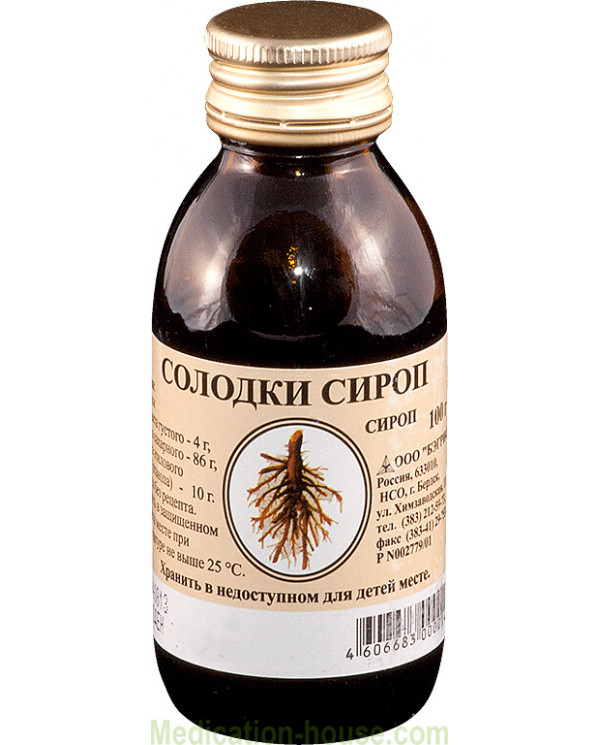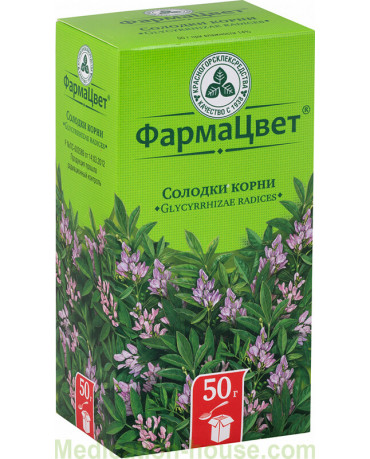Licorice root syrup instruction
You can buy Licorice root syrup here
When our body needs help, we do not always think of affordable and effective herbal preparations. Many of us trustfully buy widely publicized dosage forms, the basis of which are extracts from medicinal plants. For example, not everyone knows that the perennial herbaceous culture of the legume family - licorice, licorice or licorice - is a universal product for the treatment of various types of cough, and not only.
Licorice grows wild throughout Eurasia and North Africa. In order to obtain medicinal raw materials - licorice root - cultivated in most countries located on the territories of our planet with a temperate climate.
Rhizomes are harvested throughout the year. The dug roots are freed from the soil or washed in cool water, cut into small bars, dried in the sun or in special dryers, and then pressed into briquettes. The resulting raw material retains therapeutic qualities for 10 years.
One of the indications for treatment with licorice root Syrup is gastritis. Gastritis is an inflammatory process of varying severity in the gastric mucosa, accompanied by a violation of its basic functions. It may be asymptomatic, and may be brightly manifested. In this case, the appointment of symptomatic therapy is indispensable. The combination of patient complaints and clinical diagnosis fits into the concept of functional dyspepsia. The causes of gastritis can be many factors:
Seeding Helicobacter pylori.
Errors of nutrition and daily routine: a long break between meals, the use of fatty, fried, salty foods, smoked meats.
Smoking.
Reception of non-steroidal anti-inflammatory drugs: if it is necessary, then additional medications that protect the gastric mucosa should always be used.
Gastrointestinal parasites.
Stress: due to effects on the sympathetic nervous system.
Genetic predisposition.
Autoimmune processes in the body.
For differential diagnosis, a patient with a suspected inflammatory disease of the gastric mucosa must be prescribed a clinical minimum: a clinical blood test, a general urine test, a biochemical blood test with glucose, cholesterol, creatinine, urea, liver enzymes, amylase, lung fluorography, ultrasound diagnostics abdominal organs, esophagogastroduodenoscopy. In addition, other laboratory and instrumental diagnostic methods may be needed to clarify the diagnosis and prescribe the correct treatment.
With gastritis, a diet with a restriction of fatty, hot, cold, salty, smoked, with fractional nutrition and three-hour breaks between meals is necessarily prescribed. In addition, etiotropic therapy is prescribed, aimed at the cause (for example, antibacterial for seeding with Helicobacter pylori), a pathogenetic treatment that affects the main pathogenesis of gastritis. To relieve symptoms that violate the quality of life, symptomatic drugs are effective, including licorice root syrup, which has an anti-inflammatory effect.
Pharmacological group
Licorice root syrup is a herbal remedy with anti-inflammatory, expectorant and immunostimulating effects. A remedy is made from licorice rhizomes. It is used mainly at the outpatient stage in both adults and children.
Release form and component composition
It is available in the form of a syrup for oral administration per os, packaged in dark glass bottles with a volume of one hundred milliliters.
In the box with the drug there is an instruction for use with all the necessary recommendations.
The composition of the medication includes the main pharmaceutical substance - extract from the rhizomes of licorice root in the amount of four grams. In addition, the phytopreparation contains a small amount of additional substances necessary for giving the dosage form, which is a syrup.
Pharmacological action and pharmacokinetic parameters of a herbal drug
The syrup contains the main pharmaceutical substance - extract from the rhizomes of the licorice plant. Licorice root, in turn, contains glycyrrhizic acid, which has a pronounced anti-inflammatory effect, as well as a hypotensive and decongestant effect. At the level of enzymes and enzymatic processes, it acts on viral agents, thereby the antiviral mechanism of licorice root is implemented. In addition, the product contains flavonoids, polysaccharides, essential oils, which has a general tonic and immunostimulating effect on the body.
There is no data on the pharmacokinetic parameters of the drug, due to its plant origin. Activity is due to the action of all components.
Indications for the use of the medication
The drug is used for:
Bronchial asthma and obstructive diseases of the bronchial tree to relieve symptoms, to achieve an expectorant effect.
Acute inflammatory process in the larynx, trachea.
An acute inflammatory process in the upper respiratory tract.
Acute inflammation in the bronchial tree, accompanied by a cough.
Cough of a wet character.
Decrease in the lobe of the lung from blockage of the bronchial tree with a mucous plug.
Diseases with a chronic suppurative process in irreversibly expanded and deformed, functionally inferior bronchi.
The inflammatory process of the lung tissue.
Finding a patient in the pre- or postoperative period for carrying out rehabilitation measures to remove purulent bronchial contents and sputum from the bronchial tree.
Acute respiratory viral infections, herpes.
Inflammation of the mucous membrane of the stomach and duodenum.
A peptic ulcer of the mucous membrane of the stomach and duodenum in the healing and scarring stage.
Deficiency, hypofunction of the primary adrenal cortex.
As a rule, in all these situations, the syrup is prescribed as part of complex therapy.
Range of contraindications for the use of herbal infusion with ethyl alcohol content
Do not use the medication for:
Increased individual sensitivity to the main pharmaceutical substances, as well as additional substances necessary to give the dosage form, which is a syrup.
Pathologies of the kidneys with a glomerular filtration rate by Reberg's test of less than 30 milliliters per minute.
Pathologies of the liver, having class B and C on the Child-Pugh scale.
Treatment of children under the age of six months.
Peptic ulcer of the gastric mucosa and duodenum in the acute stage.
Inflammation of the gastric mucosa in the stage of exacerbation of the process.
Chronic viral hepatitis of the liver, cirrhotic liver damage.
Endocrine disease - diabetes.
Violation of the rhythm of cardiac activity.
Decreased blood potassium levels.
Pregnancy and during breastfeeding.
Regular increase in blood pressure above normal.
With caution, under the constant supervision of a specialist, use in the treatment of patients with active forms of the disease caused by mycobacterium tuberculosis, fungal, viral and bacterial pathogens, in the treatment of respiratory pathologies, decompensated liver cirrhosis.
Side effect of a medication that relieves the symptoms of inflammation
Undesirable effects are possible, such as:
Allergic reactions in the form of a rash, accompanied by itching or without it, redness of the skin, angioedema, rarely - anaphylactic shock.
Dyspeptic symptoms in the form of nausea, vomiting, pain in the stomach or intestines, constipation, frequent loose stools, digestive disorders of a functional nature, excessive accumulation of gases in the intestines.
Headache of various localization and severity.
Weakness, drowsiness, apathy, syndrome of internal anxiety, feelings of discomfort.
Edema, increased blood pressure, impaired cardiac activity.
Pathologies from the genitourinary system.
Increased sodium levels, decreased potassium levels in the blood with prolonged use.
If side effects occur, you must consult a specialist to resolve the issue of further use of the medication.
Use of medicine: method, features, dose
Before use, it is necessary to consult a specialist, carefully read the recommendations again, take into account indications and contraindications. The dosage is selected individually at an appointment with the attending physician. The syrup is taken orally per os, using a measuring spoon, a dessert and a teaspoon for dosing. The recommended dose for adults is one spoonful of Syrup, diluted in the required amount of water (half a glass), three times a day. Children up to two years of age - in the glass with water, drop as many drops that correspond to the age of the child. Children from two to twelve years old - half a teaspoon of Syrup, diluted in a quarter glass of water. Children over twelve years of age are prescribed a whole teaspoon of herbal medicine three times a day. The course of therapy is up to ten days.
Special instructions when using the product
In pediatrics, the drug is used, the effects of the drug on children older than six months have been studied enough. Use in children up to six months is impractical. For elderly patients, dosage reduction is not required. In case of impaired renal function while maintaining a glomerular filtration rate of more than 30 milliliters per minute, dose adjustment is not required. With class A liver pathologies, the Child-Pugh scale adjustment is not needed. In patients with more severe injuries of these organs, the use of a phytotherapy is contraindicated.
The use of herbal medicine during pregnancy and until the termination of breastfeeding
Insufficient evidence of use for therapy. Licorice root syrup should not be taken to avoid negative effects on the fetus and pregnant woman. There is no data on the ability of the main pharmaceutical substance to penetrate the blood-milk barrier. Do not use while breastfeeding or just as a short course of treatment.
Overdose
Instructions for use do not describe cases of taking doses in larger quantities than recommended at a consultation with a specialist or in recommendations for use. Symptoms similar to those from the paragraph on undesirable effects are possible: dyspeptic disorders in the form of nausea, vomiting, pain in the stomach and intestines, as well as allergic reactions to the components of the medication. The treatment is symptomatic. A medication of a specific action that stops or attenuates the effect of large doses taken (antidote) has not been developed. Dialysis is not used.
Concomitant use with other drugs and compatibility with alcoholic beverages
It is not recommended to use together with drugs of a similar effect. It is necessary to inform the doctor about all medicines that are regularly used, since there is a risk of weakening or strengthening the action of the main pharmaceutical substances. A complete list of drugs not recommended for use in conjunction with herbal collection is presented in the official recommendations. Alcohol during the course of treatment is strictly prohibited.
Storage conditions
A syrup requires optimal storage conditions, including items such as:
Compliance with dry temperatures up to thirty degrees.
Use before the expiration date of two years.
Inaccessibility for children.
After the expiration of the period do not apply.
Reviews on Licorice Root Syrup
According to reviews, Licorice Root Syrup is an inexpensive, natural, and effective drug for treating cough. One of its advantages is the ability to use by patients of all ages. However, it must be borne in mind that alcohol is part of the drug.
Not everyone likes the sweet taste of syrup. It is also noted that the drug has a therapeutic effect when taken at the beginning of the disease.
Terms of sell
You don't need a prescription to buy Licorice root syrup.


